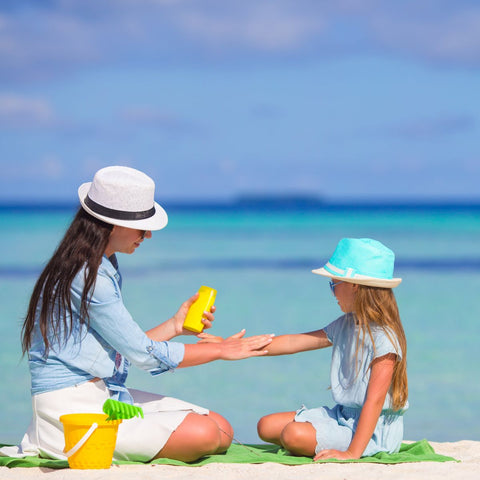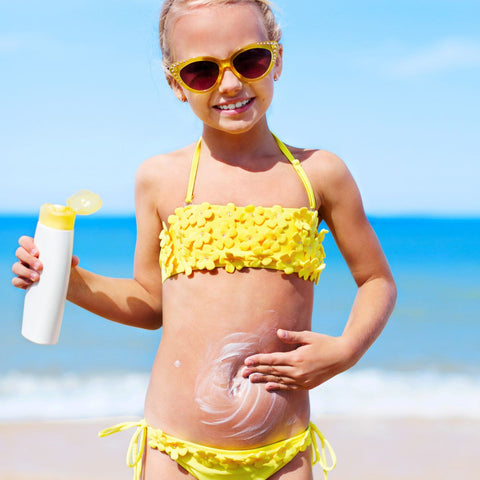As a summer baby, I lay claim to the sun. I thrive in the sun shining summer months. Sunbathing brings me a joy unlike anything else. It’s truly soul filling. Unfortunately, the love I have for basking in the sun is reciprocated with skin cancer. My mom and grandma both had skin cancer, and I have had so many precancerous moles sliced off me I can’t keep track. The amount of times I’ve had someone tell me I have a funky looking mole--and not just from close family or friends--is embarrassing. So, although I LOVE the sun, I also am very aware of how much I need to protect myself and my family from it.
Here are the best ways to protect you and your family from having to go to the dermatologist all the time like me:
Newborns and Sun Protection
Did you know newborns aren’t supposed to wear sunscreen? Yeah, I didn’t either. According to experts, babies shouldn’t wear sunscreen until they are at least 6 months old. Newborns may not be able to keep out the chemicals found in sunscreen like the rest of us can. It may also cause a rash or other skin irritation. So the best thing to do is keep those new precious babes out of direct sunlight-- have them wear wide brimmed hats and lightweight sun protective clothes.
SPF
Dermatologists recommend using at least 30 SPF. SPF is the measure of how much solar energy is required to produce sunburn on protected skin (someone wearing sunscreen) relative to the amount of solar energy required to produce sunburn on unprotected skin (someone not wearing sunscreen). As the SPF increases, sunburn protection increases.
Broad Spectrum Sunscreen
Broad spectrum sunscreens include combinations of ingredients that protect from both types of rays (UVA and UVB). UVB rays are what cause skin reddening and skin cancer. UVA are the rays that prematurely age your skin, which is why you will find more facial broad spectrum sunscreens than whole body ones. Keep an eye out for a combination of zinc oxide, octinoxate, octisalate and titanium dioxide. Different combinations of these ingredients will protect against both UVA and UVB rays for full protection.

Water-Resistant and Waterproof Sunscreens
Water-resistant formulas stand up to water better than regular sunscreens. Waterproof sunscreens, on the other hand, are formulated to last twice as long as water-resistant formulas. To ensure continued protection, reapply after each swim. This isn’t just for swimming either. If you are outside and sweating you will want a water resistant or proof sunscreen. Most sun protection labeled “sport” are at least water-resistant.
Reapplication
Sunscreen should be reapplied every two hours and even more if you are outside swimming or sweating. This may seem daunting, but a quick spray sunscreen makes reapplication so much easier. There are also powder facial sunscreens that double as a nice way to dry up some of that sweat or oil you get throughout the day.

I’m so glad that fake tans are less orange now and the tanning beds are less trendy, but we still have to keep up on everyday sun exposure. Make sunscreen and sun protection a part of yours and your family’s everyday routine.
For more tips on keeping your family safe go to thebabycubbywarehouse.com.






